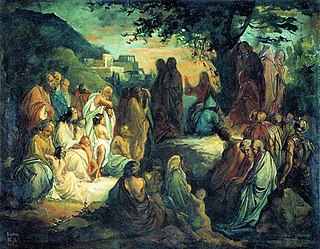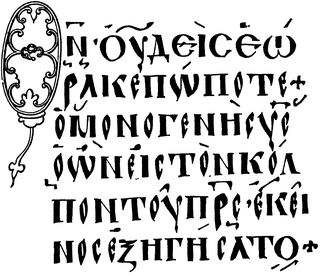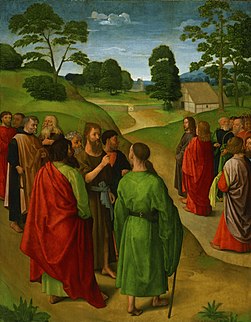| John 1:10 | |
|---|---|
← 1:9 1:11 → | |
 John 1:1–16 in Papyrus 75 (AD 175–225) | |
| Book | Gospel of John |
| Christian Bible part | New Testament |
John 1:10 is the tenth verse in the first chapter of the Gospel of John in the New Testament of the Christian Bible.
| John 1:10 | |
|---|---|
← 1:9 1:11 → | |
 John 1:1–16 in Papyrus 75 (AD 175–225) | |
| Book | Gospel of John |
| Christian Bible part | New Testament |
John 1:10 is the tenth verse in the first chapter of the Gospel of John in the New Testament of the Christian Bible.
In the original Greek according to Westcott-Hort this verse is:
In the King James Version of the Bible the text reads:
The New International Version translates the passage as:
Concerning the verse "He was in the world, ... ", many have understood this verse to refer to Christ, who was in the world right from the start of its first creation, producing and ruling over everything. But the second verse tells us that the blind sinful world did not know and worship him. But there are others who apply these words to the incarnate Son of God; whom even God's own elect people, refused to receive and believe. [1] [2]
Augustine: "The Light which lighteneth every man that cometh into the world, came here in the flesh; because while He was here in His Divinity alone, the foolish, blind, and un-righteous could not discern Him; those of whom it is said above, The darkness comprehended it not. Hence the text; He was in the world." [3]
Origen: "For as, when a person leaves off speaking, his voice ceases to be, and vanishes; so if the Heavenly Father should cease to speak His Word, the effect of that Word, i. e. the universe which is created in the Word, shall cease to exist." [3]
Augustine: "You must not suppose, however, that He was in the world in the same sense in which the earth, cattle, men, are in the world; but in the sense in which an artificer controls his own work; whence the text, And the world was made by Him. Nor again did He make it after the manner of an artificer; for whereas an artificer is external to what he fabricates, God pervades the world, carrying on the work of creation in every part, and never absent from any part: by the presence of His Majesty He both makes and controls what is made. Thus He was in the world, as He by Whom the world was made." [3]
Chrysostom: "And again, because He was in the world, but not coeval with the world, for this cause he introduced the words, and the world was made by Him: thus taking you back again to the eternal existence of the Only-Begotten. For when we are told that the whole of creation was made by Him, we must be very dull not to acknowledge that the Maker existed before the work." [3]
Theophylact of Ohrid: "Here he overthrows at once the insane notion of the Manichæano, who says that the world is the work of a malignant creature, and the opinion of the Arian, that the Son of God is a creature." [3]
Augustine: "But what meaneth this, The world was made by Him? The earth, sky, and sea, and all that are therein, are called the world. But in another sense, the lovers of the world are called the world, of whom he says, And the world knew Him not. For did the sky, or Angels, not know their Creator, Whom the very devils confess, Whom the whole universe has borne witness to? Who then did not know Him? Those who, from their love of the world, are called the world; for such live in heart in the world, while those who do not love it, have their body in the world, but their heart in heaven; as saith the Apostle, our conversation is in heaven. (Phil. 3:20) By their love of the world, such men merit being called by the name of the place where they live. And just as in speaking of a bad house, or good house, we do not mean praise or blame to the walls, but to the inhabitants; so when we talk of the world, we mean those who live there in the love of it." [3]
Chrysostom: "But they who were the friends of God, knew Him even before His presence in the body; whence Christ saith below, Your father Abraham rejoiced to see My day. When the Gentiles then interrupt us with the question, Why has He come in these last times to work our salvation, having neglected us so long? we reply, that He was in the world before, superintending what He had made, and was known to all who were worthy of Him; and that, if the world knew Him not, those of whom the world was not worthy knew Him. The reason follows, why the world knew Him not. The Evangelist calls those men the world, who are tied to the world, and savour of worldly things; for there is nothing that disturbs the mind so much, as this melting with the love of present things." [3]

Matthew 6:12 is the twelfth verse of the sixth chapter of the Gospel of Matthew in the New Testament and is part of the Sermon on the Mount. This verse is the fourth one of the Lord's Prayer, one of the best known parts of the entire New Testament. This verse contains the fifth petition to God.

Matthew 5:45 is the forty-fifth verse of the fifth chapter of the Gospel of Matthew in the New Testament and is part of the Sermon on the Mount. This is the third verse of the final antithesis, that on the commandment: "Love thy neighbour as thyself". Jesus here explains why one must love one's enemies.

Matthew 7:12 is the twelfth verse of the seventh chapter of the Gospel of Matthew in the New Testament and is part of the Sermon on the Mount. This well known verse presents what has become known as the Golden Rule.

John 1:5 is the fifth verse in the first chapter of the Gospel of John in the New Testament of the Christian Bible.

Matthew 7:21 is the twenty-first verse of the seventh chapter of the Gospel of Matthew in the New Testament and is part of the Sermon on the Mount. This verse continues Jesus' warning against false prophets.

Matthew 7:23 is the twenty-third verse of the seventh chapter of the Gospel of Matthew in the New Testament and is part of the Sermon on the Mount. This verse continues Jesus' warning against false prophets.

Matthew 8:4 is the fourth verse of the eighth chapter of the Gospel of Matthew in the New Testament. This verse concludes the miracle story of Jesus cleansing a leper, the first of a series of miracles in Matthew.
Matthew 8:9 is the ninth verse of the eighth chapter of the Gospel of Matthew in the New Testament. This verse continues the miracle story of healing the centurion's servant, the second of a series of miracles in Matthew.

Matthew 8:29 is the 29th verse in the eighth chapter of the Gospel of Matthew in the New Testament.

John 1:18 is the eighteenth verse in the first chapter of the Gospel of John in the New Testament of the Christian Bible.

John 1:29 is the twenty-ninth verse in the first chapter of the Gospel of John in the New Testament of the Christian Bible.

John 1:14 is the fourteenth verse in the first chapter of the Gospel of John in the New Testament of the Christian Bible.

John 1:3 is the third verse in the first chapter of the Gospel of John in the New Testament of the Christian Bible.

John 1:11 is the eleventh verse in the first chapter of the Gospel of John in the New Testament of the Christian Bible.

John 1:12 is the twelfth verse in the first chapter of the Gospel of John in the New Testament of the Christian Bible.

John 1:32 is the 32nd verse in the first chapter of the Gospel of John in the New Testament of the Christian Bible.

John 1:33 is the 33rd verse in the first chapter of the Gospel of John in the New Testament of the Christian Bible.

John 1:36 is the 36th verse in the first chapter of the Gospel of John in the New Testament of the Christian Bible.

John 1:39 is the 39th verse in the first chapter of the Gospel of John in the New Testament of the Christian Bible.

John 1:41 is the 41st verse in the first chapter of the Gospel of John in the New Testament of the Christian Bible.
| Preceded by John 1:9 | Gospel of John Chapter 1 | Succeeded by John 1:11 |